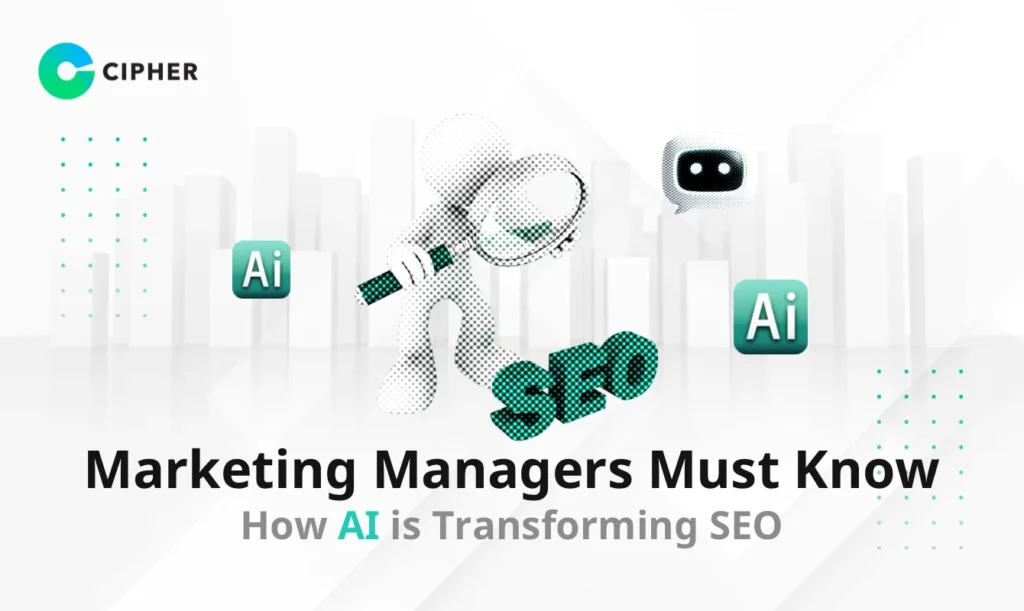In today’s highly competitive and ever-changing digital world, Marketing Managers need to stay ahead of emerging trends, especially with the arrival of AI that’s revolutionizing the SEO landscape. This article will explore why today’s Marketing Managers must adapt their SEO strategies to align with AI and how to ensure your brand isn’t just “found” but becomes the “answer” that AI chooses to present to users.
Table of Contents
The Transformed Search Landscape Through AI
Imagine having an incredibly intelligent assistant who deeply understands every question you ask and can instantly summarize relevant information from sources worldwide—that’s what AI is doing to the search world, and it’s something Marketing Managers must understand to perform effectively.
In the past, people typically began searches with simple phrases like “Japanese restaurant” or “how to make cake,” hoping search engines would display a list of relevant websites for them to browse. This was fundamental knowledge about SEO that Marketing Managers needed to understand for digital marketing.
However, with today’s AI advancements, search engines no longer just look at those words or phrases. They can “understand” broader contexts, interpret complex meanings of questions, and accurately access the true “Search Intent” of users.
When you ask “how to make banana cake,” AI tries to understand what you really want—a recipe? Detailed steps? A tutorial video? All to provide the answer that best suits your needs. This is what modern Marketing Managers must consider in every marketing piece.
This major shift has completely changed how websites are ranked. Stuffing keywords into content hoping to rank is now outdated. Today, rankings depend on how thoroughly your content “answers” users’ questions, how credible it is, and how naturally it’s presented. This is the heart of AI SEO that Marketing Managers must thoroughly understand to effectively manage their marketing teams.
What is AI SEO? What is AI SEO? Why Should Marketing Managers Care?

AI SEO, or Artificial Intelligence Search Engine Optimization, means adapting all SEO strategies to align with how AI-powered search engines work today. It’s not just about making websites “findable” but making your content “the answer” that AI chooses to present directly to users, which presents a significant challenge for digital-age Marketing Managers.
The differences between traditional SEO and AI SEO that Marketing Managers need to understand include:
Traditional SEO:
- Keyword research using older tools like Google Keyword Planner
- Focus on On-page and Off-page techniques requiring human analysis
- Content creation primarily by humans
- Manual website optimization for Core Web Vitals and algorithms
AI SEO:
- Using AI to analyze keywords and automatically recommend appropriate terms
- Using AI to create content that addresses search queries
- Learning user behavior and optimizing websites to match User Intent
- Analyzing internal/external links with AI for maximum efficiency
Why should Marketing Managers care about AI SEO in their marketing work? Because in-depth data from SE Ranking indicates that AI can effectively increase sales, reduce workload, and improve marketing team efficiency by:
- 54% of SEO experts leverage AI in their work
- Google creates AI-generated answers for 8.71% of all keywords
- Detailed searches using ten search terms have a 19.10% chance of triggering AI overview displays
- The information summarized by AI is very detailed, averaging around 4,342 characters
What’s interesting for Marketing Managers is that 84.72% of websites referenced in Google AI Overviews are typically sites ranking 1-10 in organic search results. This represents a golden opportunity for brands ready to adapt and is a direct responsibility of Marketing Managers to guide their teams to adjust in time!
User Search Behavior in the AI Era
AI hasn’t just changed how search engines work—it has significantly impacted user search behavior. Marketing Managers must understand these changes to adapt their roles and SEO strategies to address new behaviors, including:
- More Natural Conversations – Users are accustomed to asking questions to AI like ChatGPT or Gemini using natural language, not just typing short keywords anymore, but conversing as if talking to a real person. Marketing Managers must adjust their content creation approach to accommodate this new search style.
- Demand for Precise and Quick Answers – Today’s users expect immediately concise and relevant summarized answers without spending time clicking through multiple websites, which “Google AI Overview” appearing at the top of search results addresses. Marketing Manager’s work must therefore shift to make content easily accessible and quick to answer questions.
- Looking for Credible In-depth Information – While wanting speed, users still seek deep and credible information. AI thus plays a crucial role in filtering and presenting high-quality information sources summarized for users. Marketing Managers must therefore create content that is both credible and highly valuable.
These changing behaviors reflect that Marketing Managers must seriously adjust their perspective and SEO strategies. It’s not just about making websites “findable” but making your website “the answer” that AI will present first, which is a new challenge in the digital-age Marketing Manager’s job.
SEO Strategies Marketing Managers Must Adapt in the AI Era
1. Create In-depth Content That Addresses User Needs
AI-era content must be comprehensive and answer user questions as completely as possible. Surface-level writing is no longer sufficient. Marketing Managers must lead their teams to analyze what users really want to know and provide deep, clear, and valuable answers.
For example, instead of writing a short article about “How to do SEO,” try creating a comprehensive guide covering all aspects, from keyword research to measurement, with real examples and case studies. It’s the Marketing Manager’s responsibility to set the direction for creating deep and comprehensive content.
2. Use Natural Language and Structures That AI Understands Easily
AI prefers content written in natural, uncomplicated language with clear structure. Marketing Managers should guide their teams to divide content into sections with headings (H1, H2, H3) to help AI better understand the context of the content.
Techniques to use in marketing work include:
- Write short, clear, easy-to-understand sentences
- Break paragraphs for easy reading, not too long
- Use headings and subheadings to organize content
- Focus on answering questions users commonly ask
3. Build Credibility with E-E-A-T Principles
Google increasingly emphasizes E-E-A-T (Experience, Expertise, Authoritativeness, Trustworthiness) in the AI era. The Marketing Manager’s role is to lead the team to create content that demonstrates:
- Comes from those with real experience (Experience)
- Written by industry experts (Expertise)
- Comes from authoritative industry sources (Authoritativeness)
- Is trustworthy and verifiable (Trustworthiness)
This can be done by Marketing Managers encouraging their team to:
- Reference credible sources
- Include author information showing expertise
- Keep content updated regularly
- Present real research or case studies
4. Use NLP Techniques to Help AI Better Understand Content
Natural Language Processing (NLP) is technology that helps AI better understand human language. Marketing Managers should incorporate NLP techniques in marketing work as follows:
- Use Long-tail Keywords – Longer, natural keywords help AI understand context better. For example, instead of just “SEO,” try “How to make SEO rank on first page in 2025.” It’s the Marketing Manager’s responsibility to strategize the use of long keywords.
- Create Question-Based Content – Google likes to display content that directly answers questions. Marketing Managers should encourage using questions as headings followed by clear answers to increase chances of appearing in AI Overviews.
- Use Schema Markup – JSON-LD Schema Markup structures help Google’s AI better understand website information. Marketing Managers should work with technical teams to apply Schema Markup to various data, whether articles, reviews, or product information.
- Add Context with LSI Keywords – Using words related to main keywords (LSI Keywords) helps AI understand the meaning and context of content more deeply. It’s the Marketing Manager’s responsibility to oversee the use of words to be comprehensive and natural.
Personas of Successful Marketing Managers in the AI SEO Era
1. Digital Transformation Leader
Key Characteristics: A Marketing Manager who focuses on applying new technologies to marketing strategies, has foresight, and is willing to experiment with new things.
Challenges with AI SEO: Balancing cutting-edge technology with consumers’ basic needs
How to Adapt:
- Continuously study AI technology through training and workshops
- Pilot small AI SEO projects to prove effectiveness before scaling
- Build teams with mixed skills between technological understanding and creativity
2. Data-Driven Marketer
Key Characteristics: A Marketing Manager who makes decisions based on data, accurately analyzing numbers and trends.
Challenges with AI SEO: Transforming the vast amount of data AI generates into actionable strategies.
How to Adapt:
- Develop advanced data analysis skills, especially Machine Learning Insights
- Use AI to find complex and constantly changing User Intent
- Create dashboards showing real-time AI SEO results
3. Content Quality Champion
Key Characteristics: A Marketing Manager who prioritizes content quality over quantity, focusing on creating value for readers.
Challenges with AI SEO: Maintaining balance between creating content that pleases AI and content that truly values humans
How to Adapt:
- Learn to use AI to analyze existing content and improve it to address both readers and algorithms
- Develop content creation processes that combine human creativity with AI efficiency
- Emphasize E-E-A-T in all content to increase credibility in Google’s eyes
4. Cross-Functional Collaborator
Key Characteristics: A Marketing Manager who can work with diverse teams, including technical teams, sales teams, and customer service teams.
Challenges with AI SEO: Communicating the complexity of AI SEO so all departments understand and can collaborate.
How to Adapt:
- Hold regular meetings between SEO, Content, and Developer teams to understand common goals
- Create shared language and objectives that all teams understand
- Develop work systems where all teams can track AI SEO strategy progress
5. Strategic Visionary
Key Characteristics: A Marketing Manager who can plan long-term, see the big picture, and connect SEO strategies with business goals.
Challenges with AI SEO: Predicting and preparing for rapid changes in AI algorithms.
How to Adapt:
- Closely monitor changes in AI technology and Google algorithm updates
- Plan flexible strategies that can adapt to situations
- Build an SEO team knowledgeable in both technical and marketing aspects to handle changes
Analyzing which type of Marketing Manager you are will help you understand your strengths and areas to develop to better handle AI SEO challenges. You don’t need to be an expert in every area but must know how to use available resources and teams most effectively.
AI Tools for Marketing Managers in SEO

1. Gemini
2. Ahrefs
A leading SEO tool that uses AI to analyze keywords and competitors, check backlinks, and track search rankings. It helps Marketing Managers see a complete overview of SEO strategies and plan marketing work efficiently.
3. Surfer SEO
4. Frase
An AI tool that helps create SEO content by analyzing questions users often search for and helps structure content to answer those questions comprehensively. It helps Marketing Managers and teams create content that appeals to readers and is AI-friendly.
However, these AI technologies should only be supplementary tools, not replacements for human creativity and judgment. Smart Marketing Managers will use AI as an assistant in marketing work, not the complete decision-maker.
Preparing Your Brand for Google SGE
Keywords That Trigger AI Overviews
Recent research found that certain types of keywords are more likely to trigger AI Overviews displays, which is important information for Marketing Manager work, including:
- “What is” type questions increased by 20%
- “How to” type questions increased by 15%
- Questions with the phrase “symptoms of” increased by 12%
- Questions with the word “treatment” increased by 10%
Additionally, long-tail keywords with specificity often trigger AI Overviews displays well, even with low search volume. Marketing Managers should strategize using these keywords in marketing work to increase ranking chances.
Improve Core Web Vitals to Increase Chances of Appearing in AI Overviews
- Website Performance Enhancement:
- Improve Website Speed
- Optimize image assets by reducing file sizes and adopting next-generation formats like WebP
- Use Lazy Loading to reduce unnecessary data loading
- Improve Mobile Usability
- Make websites support Mobile-first Indexing
- Use Responsive Design suitable for all screen sizes
- Optimize UX/UI to be AI-friendly
- Use well-structured Internal Links
- Add Rich Snippets with Schema Markup
AI SEO Services from CIPHER for Modern Marketing Managers
CIPHER understands the challenges of Marketing Managers in the AI era. We’re ready to help you stay ahead of competitors with comprehensive AI SEO services for modern marketing:
1. Comprehensive AI SEO Strategy Analysis for Marketing Managers
2. Develop AI-Ready Content for Marketing Work That Appears in Overviews
3. Enhance Website Efficiency with Core Web Vitals
4. Track and Measure with AI Analytics for Marketing Managers
5. AI-Driven Marketing Automation
We help you save time and resources with Marketing Automation systems using AI to manage campaigns, analyze results, and improve efficiency in real-time. This helps Marketing Managers efficiently manage teams and resources.
As your Digital Marketing partner, CIPHER not only understands AI technology but also understands the roles and challenges of modern Marketing Managers to create SEO strategies leading to tangible business results.
Conclusion
AI is rapidly revolutionizing the SEO industry, creating opportunities for Marketing Managers who adapt quickly to gain competitive advantages. The key remains creating content valuable to users, fully addressing their needs, and creating good user experiences. Marketing Managers who understand how AI SEO works and lead teams to adapt quickly will become market leaders, while those stuck with old techniques will be left behind. CIPHER is ready to partner in elevating your AI SEO strategy for sustainable success in the digital era.
Additionally, Marketing Managers can use tools like Yoast SEO to help optimize content to be AI-friendly and efficiently increase ranking opportunities.





